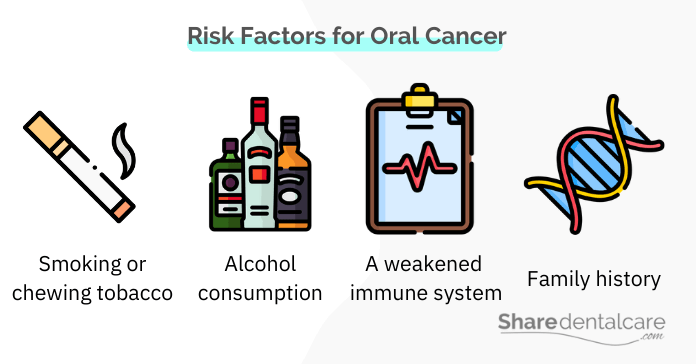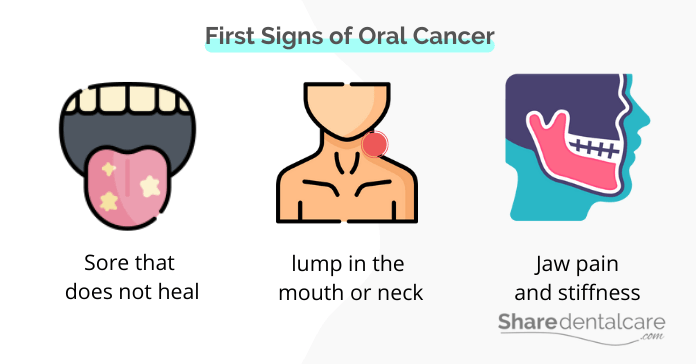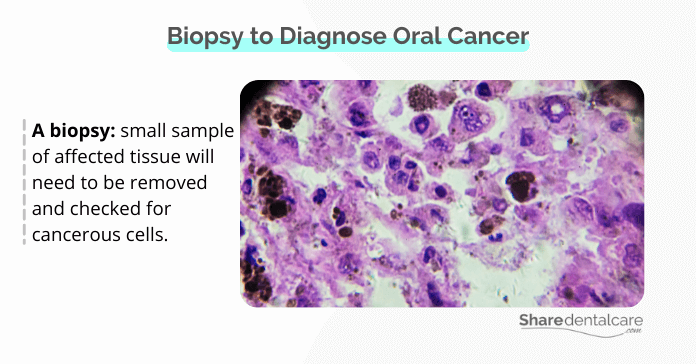It is important to be aware of the first signs of oral cancer, as early detection can lead to more successful treatment. Oral cancer can often be mistaken for other conditions, so you should know what to look for. In this blog post, we will discuss the first signs of oral cancer and when you should seek medical help.
What is Oral Cancer?
Oral cancer, also known as mouth cancer, is a disease involving abnormal cell growth in the mouth. It can occur in any part of the mouth, including the lips, tongue, cheeks, gums, or roof of the mouth. Oral cancer can be deadly if not treated early, so it is important to be aware of the first signs.
Causes & Risk Factors
The exact cause of oral cancer is not known, but there are several risk factors that can increase your chances of developing the disease. Some of the most common risk factors for mouth cancer lesions include:
- Smoking or using tobacco products. It is one of the major risk factors for oral cancer.
- Excessive alcohol consumption.
- Prolonged exposure to the sun or UV radiation.
- History of HPV infection, a sexually transmitted virus.
- A weakened immune system.
- Family history of oral cancer.
- Poor nutrition.
If you have any of these risk factors, it is important to be especially vigilant about watching for the first signs of oral cancer. You can read more about how mouth cancer starts.

What are The First Signs of Oral Cancer?
There are several first signs of oral cancer that you should be aware of. The most common symptoms include:
- A sore or lesion in the mouth that does not heal.
- A lump or mass in the mouth or neck.
- White or red patches inside the mouth.
- Swelling of the jaw.
- Difficulty chewing or swallowing.
- Bleeding in the mouth.
- Hoarseness or a change in voice.
- Jaw pain and stiffness.
- Tongue pain.
If you experience any of these symptoms, don’t panic. Some of these symptoms can be caused by other conditions, such as a tooth abscess or gum infection. However, you should visit your dentist immediately if any of these symptoms persist for more than two weeks or you have more than one at a time. So, visit your dentist or doctor to determine the underlying cause and treat it. You can read more about the early detection of oral cancer.

What Do Doctors Do When They Notice The First Signs of Oral Cancer?
If the doctor suspects oral cancer, they will perform a physical examination and order some tests to confirm the diagnosis. Some of the tests that may be performed include:
- A biopsy, in which a small sample of tissue is taken from the tumor for examination
- X-rays to look for tumors or lesions in the mouth
- CT scans create a three-dimensional image of the tumor
- MRI scans provide detailed images of soft tissues
- PET scans help to determine how active the tumor is
Once the diagnosis is confirmed, the doctor will develop a treatment plan. Treatment for oral cancer depends on the stage of the disease but may include surgery, radiation therapy, or chemotherapy. Early diagnosis is key to successful treatment, so it is important to be aware of the first signs and seek medical help if you experience any of them.

Treatment Options
Oral cancer can be treated successfully if it is diagnosed early, so don’t ignore the first signs. There are three main types of treatment for oral cancer: surgery, radiation therapy, and chemotherapy.
- Surgery is the most common treatment and involves removing the tumor and some surrounding tissue.
- Radiation therapy uses high-energy beams to kill cancer cells.
- Chemotherapy uses drugs to kill cancer cells.
- Nutrition is also an important part of treatment, so it is important to eat a healthy diet.
The treatment depends on the stage of the disease and the person’s health condition.
Don’t Ignore The First Signs of Oral Cancer
Early detection of oral cancer is the key to a successful treatment. If you experience any of the first signs, don’t ignore them and see your dentist or doctor immediately for diagnosis and treatment. Ignoring the first signs of oral cancer can cause the disease to spread to other parts of the body and become more difficult to treat. So, be aware of the first signs and don’t wait until it’s too late.
First Signs of Oral Cancer – Conclusion
It is important to be aware of the first signs of oral cancer so that you can get treatment as soon as possible. The signs include a sore or lesion that doesn’t heal, a lump or mass in the mouth or neck, white or red patches inside the mouth, and swelling of the jaw.
Don’t panic if you experience any of these signs and symptoms because they can also be caused by other conditions. Visit your dentist or doctor immediately to determine the underlying cause and get treatment. Oral cancer can be treated successfully if it is diagnosed early, so don’t ignore the first signs.